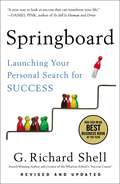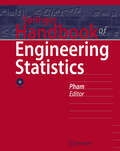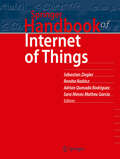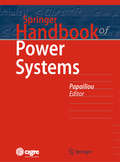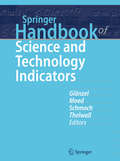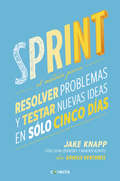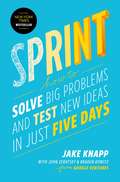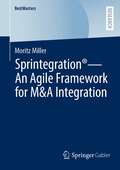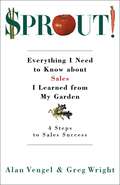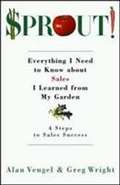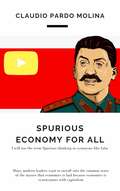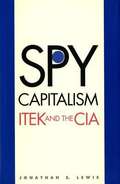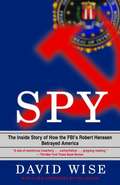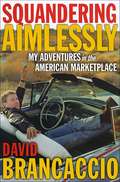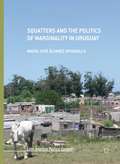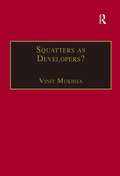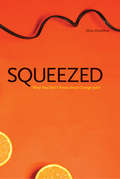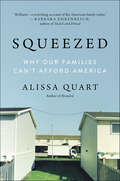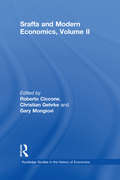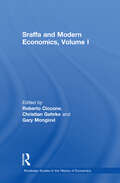- Table View
- List View
Springboard
by G. Richard ShellEveryone knows that you are supposed to "follow your dream." But where is the road map to help you discover what that dream is? You have just found it. In Springboard, award-winning author and teacher G. Richard Shell helps you find your future. His advice: Take an honest look inside and then answer two questions: What, for me, is success? How will I achieve it? You will begin by assessing your current beliefs about success, including the hidden influences of family, media, and culture. These are where the pressures to live "someone else's life" come from. Once you gain perspective on these outside forces, you will be ready to look inside at your unique combination of passions and capabilities. The goal: to focus more on what gives meaning and excitement to your life and less on what you are "supposed" to want. Drawing on his decades of research, Shell offers personalized assessments to help you probe your past, imagine your future, and measure your strengths. He then combines these with the latest scientific insights on everything from self-confidence and happiness to relationships and careers. Throughout, he shares inspiring examples of people who found what they were meant to do by embracing their own true measure of success. Eric Adler: one of Shell's former students who walked away from a conventional business career to help launch a revolutionary new concept in public education that has placed hundreds of inner-city high school students in top colleges. Kurt Timken: a Harvard-educated son of a Fortune 500 CEO who found his true calling as a hard-charging police officer fighting drug lords in southern California. Cynthia Stafford: an office worker who became one of her community's leading promoters of theater and the arts. Get ready for the journey of a lifetime--one that will help you reevaluate your future and envision success on your own terms. Students and executives say that Richard Shell's courses have changed their lives. Let this book change yours.
Springboard: Launching Your Personal Search for Success
by G. Richard ShellEveryone knows that you are supposed to "follow your dream. ” But where is the road map to help you discover what that dream is? You have just found it. In Springboard, award-winning author and teacher G. Richard Shell helps you find your future. His advice: Take an honest look inside and then answer two questions: What, for me, is success? How will I achieve it? You will begin by assessing your current beliefs about success, including the hidden influences of family, media, and culture. These are where the pressures to live "someone else’s life” come from. Once you gain perspective on these outside forces, you will be ready to look inside at your unique combination of passions and capabilities. The goal: to focus more on what gives meaning and excitement to your life and less on what you are "supposed” to want. Drawing on his decades of research, Shell offers personalized assessments to help you probe your past, imagine your future, and measure your strengths. He then combines these with the latest scientific insights on everything from self-confidence and happiness to relationships and careers. Throughout, he shares inspiring examples of people who found what they were meant to do by embracing their own true measure of success. Eric Adler: one of Shell’s former students who walked away from a conventional business career to help launch a revolutionary new concept in public education that has placed hundreds of inner-city high school students in top colleges. Kurt Timken: a Harvard-educated son of a Fortune 500 CEO who found his true calling as a hard-charging police officer fighting drug lords in southern California. Cynthia Stafford: an office worker who became one of her community’s leading promoters of theater and the arts. Get ready for the journey of a lifetime-one that will help you reevaluate your future and envision success on your own terms. Students and executives say that Richard Shell’s courses have changed their lives. Let this book change yours. .
Springer Handbook of Engineering Statistics
by Hoang PhamIn today's global and highly competitive environment, continuous improvement in the processes and products of any field of engineering is essential for survival. This book gathers together the full range of statistical techniques required by engineers from all fields. It will assist them to gain sensible statistical feedback on how their processes or products are functioning and to give them realistic predictions of how these could be improved. The handbook will be essential reading for all engineers and engineering-connected managers who are serious about keeping their methods and products at the cutting edge of quality and competitiveness.
Springer Handbook of Internet of Things (Springer Handbooks)
by Sébastien Ziegler Adrian Quesada Rodriguez Renáta Radócz Sara Nieves Matheu GarciaThis handbook is an authoritative, comprehensive reference on Internet of Things, written for practitioners, researchers, and students around the world. This book provides a definitive single point of reference material for all those interested to find out information about the basic technologies and approaches that are used to design and deploy IoT applications across a vast variety of different application fields spanning from smart buildings, smart cities, smart factories, smart farming, building automation, connected vehicles, and machine to machine communication. The book is divided into ten parts, each edited by top experts in the field. The parts include: IoT Basics, IoT Hardware and Components, Architecture and Reference Models, IoT Networks, Standards Overview, IoT Security and Privacy, From Data to Knowledge and Intelligence, Application Domains, Testbeds and Deployment, and End-User Engagement. The contributors are leading authorities in the fields of engineering and represent academia, industry, and international government and regulatory agencies.
Springer Handbook of Power Systems (Springer Handbooks)
by Konstantin O. PapailiouThis handbook offers a comprehensive source for electrical power professionals. It covers all elementary topics related to the design, development, operation and management of power systems, and provides an insight from worldwide key players in the electrical power systems industry.Edited by a renowned leader and expert in Power Systems, the book highlights international professionals’ longstanding experiences and addresses the requirements of practitioners but also of newcomers in this field in finding a solution for their problems.The structure of the book follows the physical structure of the power system from the fundamentals through components and equipment to the overall system. In addition the handbook covers certain horizontal matters, for example "Energy fundamentals", "High voltage engineering", and "High current and contact technology" and thus intends to become the major one-stop reference for all issues related to the electrical power system.
Springer Handbook of Science and Technology Indicators (Springer Handbooks)
by Ulrich Schmoch Henk F. Moed Mike Thelwall Wolfgang GlänzelThis handbook presents the state of the art of quantitative methods and models to understand and assess the science and technology system. Focusing on various aspects of the development and application of indicators derived from data on scholarly publications, patents and electronic communications, the individual chapters, written by leading experts, discuss theoretical and methodological issues, illustrate applications, highlight their policy context and relevance, and point to future research directions.A substantial portion of the book is dedicated to detailed descriptions and analyses of data sources, presenting both traditional and advanced approaches. It addresses the main bibliographic metrics and indexes, such as the journal impact factor and the h-index, as well as altmetric and webometric indicators and science mapping techniques on different levels of aggregation and in the context of their value for the assessment of research performance as well as their impact on research policy and society. It also presents and critically discusses various national research evaluation systems.Complementing the sections reflecting on the science system, the technology section includes multiple chapters that explain different aspects of patent statistics, patent classification and database search methods to retrieve patent-related information. In addition, it examines the relevance of trademarks and standards as additional technological indicators.The Springer Handbook of Science and Technology Indicators is an invaluable resource for practitioners, scientists and policy makers wanting a systematic and thorough analysis of the potential and limitations of the various approaches to assess research and research performance.
Springfield Hospital
by Robert S. Kaplan Susanna GallaniOne of the key roles of costing systems is to support the evaluation of performance and facilitate appropriate resource allocations. Through participation in a comparative cost study, management at Springfield Hospital, known for its heavy focus on operational excellence, become aware of opportunities for further improvement. Analysis of the differences in costs, uses, and allocations of resources will inform management in the decision and implementation of strategic plans. This case stimulates reflections on the importance of costing systems, in particular Time-Driven Activity Based Costing, and variance analysis as decision support mechanisms.
Sprint: El método para resolver problemas y testar nuevas ideas en solo 5 días
by Braden Kowitz John Zeratsky Jake KnappCreado por Jake Knapp, John Zeratsky y Braden Kowitz, tres socios de Google Ventures, SPRINT es un método único e infalible de 5 días para solventar problemas empresariales complicados y conseguir que la viabilidad de un proyecto se implante rápidamente. Probado con éxito en más de 100 ocasiones. Tanto los emprendedores como los directivos tienen que enfrentarse todos los días a dilemas importantes: ¿Dónde hay que poner las prioridades y por dónde hay que empezar?, ¿cuántas reuniones son necesarias para dar con la solución más adecuada? Ahora ya disponemos de un método seguro para responder a estas cuestiones cruciales: el Sprint. El diseñador Jake Knapp creó este proceso de cinco días en Google, donde los sprints se empleaban para todo tipo de proyectos, desde el Google Search hasta Google X. En Google Ventures empezó a trabajar con Braden Kowitz y John Zeratsky y los tres han conducido más de cien sprints con empresas del sector de la telefonía móvil, del comercio electrónico, la sanidad, las finanzas y otros. Como guía práctica para resolver importantes problemas empresariales, Sprint puede resultar muy útil para todo tipo de equipos de cualquier dimensión, desde pequeñas startups hasta grandes empresas multinacionales, desde equipos de profesores a empresas sin ánimo de lucro. Se trata de un libro para cualquiera con una oportunidad, idea o problema que necesite una respuesta rápida. La opinión de los expertos:«Lea este libro y siga sus consejos si quiere desarrollar productos mejores y más deprisa.»Ev Williams, fundador de Medium y Twitter «Sprint ofrece una fórmula transformadora para testar ideas, muy útil tanto si se aplica a una startup como a cualquier gran organización. En tan solo cinco días, podremos pasar de una idea inicial al prototipoy la decisión final ahorrándonos un montón de horas y dinero. Una lectura obligatoria para emprendedores de cualquier tipo.»Eric Ries, autor de El método Lean Startup «Todos los directivos que conozco están preocupados por lo mismo: ¿Nos estamos moviendo lo suficientemente rápido? Sprint nos ofrece un método paso a paso para resolver problemas de envergadura y avanzar en lo que realmente importa con rapidez. Un sprint es la cura para los males de la empresas en un mundo que va cada día más rápido.»Beth Comstock, vice-presidenta de General Electric
Sprint: How to Solve Big Problems and Test New Ideas in Just Five Days
by Braden Kowitz John Zeratsky Jake KnappFrom inside Google Ventures, a unique five-day process for solving tough problems, proven at thousands of companies in mobile, e-commerce, healthcare, finance, and more.Entrepreneurs and leaders face big questions every day: What&’s the most important place to focus your effort, and how do you start? What will your idea look like in real life? How many meetings and discussions does it take before you can be sure you have the right solution? Now there&’s a surefire way to answer these important questions: the Design Sprint, created at Google by Jake Knapp. This method is like fast-forwarding into the future, so you can see how customers react before you invest all the time and expense of creating your new product, service, or campaign. In a Design Sprint, you take a small team, clear your schedules for a week, and rapidly progress from problem, to prototype, to tested solution using the step-by-step five-day process in this book. A practical guide to answering critical business questions, Sprint is a book for teams of any size, from small startups to Fortune 100s, from teachers to nonprofits. It can replace the old office defaults with a smarter, more respectful, and more effective way of solving problems that brings out the best contributions of everyone on the team—and helps you spend your time on work that really matters.
Sprintegration® - An Agile Framework for M&A Integration (BestMasters)
by Moritz MillerThe aim of this strategic business consultancy project was the development of an applicable project management framework for sustainably successful M&A integration. Although M&As have been undertaken for decades throughout all industries, the reported high failure rates of M&A cases demonstrate the relevance of this topic and the need to create practical solutions. Therefore, this research aimed to answer the following central research question: How can a project management approach lead to a sustainably successful post-merger integration within an international real estate enterprise? The synthesis of findings from secondary and primary data led to the creation of an agile project management framework including the detailed elaboration of roles, routines, methods and tools. The framework Sprintegration® demonstrates the importance of holistic approaches including functional, operational and cultural integration, embedded in an agile system, which enables all involved stakeholders to consciously deal with the high complexity of M&As as the process of combining two previously separate companies and social systems.
Sprout!: Everything I Need to Know about Sales I Learned from My Garden
by Alan Vengel Greg WrightSales has always been a high burnout profession. These days, with the intense focus on quarterly earnings reports, there is more pressure on sales professionals than ever before. The relentless push for immediate results can leave salespeople exhausted, frustrated, and wondering why they ever got themselves into this business. And it can leave sales organizations with a serious turnover problem. SPROUT! was written by two long-time sales veterans to help their fellow professionals rediscover enthusiasm for their chosen profession and to help sales organizations retain top talent. Vengel and Wright use a page-turning story to outline a new strategy for sales, one that will make salespeople better able to cope with the inevitable ups and downs and take a more effective, long-term approach. As the book begins, Marsha Molloy has had it. Once a top pharmaceutical sales representative so crackerjack her nickname was Marsha Money, she's been laid low by a tough economy and just plain exhaustion. The once-hungry top producer has seemingly lost her touch and grown indifferent to a sales culture that appears to value faxes, emails, and cell phone chats instead of the relationship building that had been her forte. An avid gardener on a visit to her local nursery, Marsha runs into Bob Rawlings, the store's new owner and an ex-sales professional himself. They begin to chat, and Marsha mentions her career frustrations. Bob replies that he'd had the same problem, but found that the more he began treating his business like his garden, the better his business grew - and a happier, more relaxed salesman appeared. Marsha is intrigued but puzzled - how could sales be like gardening? Bob takes Marsha under his wing and, with the assistance of several other salespeople he's mentored, teaches her the secrets of his sales garden. By using the authors' sales garden metaphor to change their whole way of thinking about sales, and by adhering to the easy, practical steps outlined in SPROUT! salespeople can beat the career blues, increase their sales, and sustain themselves for the long term.
Sprout: Everything I Need to Know about Sales I Learned from My Garden
by Alan Vengel Greg WrightSprout! is about sustaining a successful career in sales, and keeping it both fun and profitable.
SpudSpy
by Lee Fleming Daniel C. SnowStudents in a technology transfer class identify a promising application for a dormant university technology. In the process, they alienate the inventor, who threatens legal action. What exactly are the problems, and how should the professor teaching the class proceed?
Spurious Economy for All
by Claudio Pardo MolinaMany modern leaders want to install into the common sense of the masses that economics is bad because economics is synonymous with capitalism. And they do it through countless spurious examples that I will be giving throughout this book. I will use the term Spurious thinking of synonyms such as illegitimate, adulterated, counterfeit, imitated, fraudulent and false. And these spurious examples are given when they explain economic problems with a part of the whole theory because the only purpose is to discredit this social science. Because as mothers and grandmothers tell us as children "A half truth is also a lie."
Spy Capitalism: Itek and the CIA
by Jonathan E. LewisWhat happens when the world of venture capital collides with the world of espionage? To find the answer, Jonathan E. Lewis takes us inside the executive suite at Itek Corporation during the Cold War years from 1957 to 1965. Itek was manufacturing the world's most sophisticated satellite reconnaissance cameras, and the information these cameras provided about Soviet missiles and military activity was critical to U. S. security. So was Itek. This intriguing book examines in unprecedented detail the challenges Itek faced not only as a contractor for the most important national security program of the time - the CIA's Project CORONA spy satellite - but also as a start-up company competing with established industrial giants. In telling the story of Itek Corporation Lewis fills important gaps in the history of American intelligence, business history, and management studies. --BOOK JACKET. Title Summary field provided by Blackwell North America, Inc. All Rights Reserved
Spy: The Inside Story of How the FBI's Robert Hanssen Betrayed America
by David WiseThe book narrates the full, authoritative story of how FBI agent Robert Hanssen, code name grayday, spied for Russia for twenty-two years in what has been called the "worst intelligence disaster in U.S. history"-and how he was finally caught in an incredible gambit by U.S. intelligence.
Spyder Active Sports--2004
by Dwight B. Crane Belen VillalongaDavid Jacobs founded a high-end ski apparel company in 1978. He successfully built and grew the company, establishing a major international brand that appealed to ski racers and other active skiers. In 1995, he sought external financing to support further growth of the company and structured a financial deal with CHB Capital Partners, a private equity firm in Denver. By 2004, Jacobs was ready to consider alternative types of equity transactions that would provide a source of liquidity to him and his family, including sale of Spyder to another apparel company and sale of a large block of stock to a private equity firm. Poses issues of valuation of a privately owned company and presents alternative ways to harvest wealth from a private company. Also brings up family business issues because the transaction would have a significant effect on two of his children who are involved in the business.
Squandering Aimlessly
by David BrancaccioPoor, misguided fellow. David Brancaccio, host of public radio's rambunctious and eclectic business program Marketplace, used to think the big problem with money was getting some. Didn't he understand that during a time of bounty the big problem is knowing what to do with money once you have it? It took a conversation with one of the richest guys in America to set him straight. "I think Warren Buffett's got the problem and Gates has the problem and Bloomberg's got the problem," the billionaire said. "And the problem doesn't just have to be at our level. It can be with people who have just a couple of million bucks." It was the second "just" in that sentence that made tears well up in Brancaccio's eyes. Most of us once thought the problem was getting some money. Now what? Squander: to spend or use something precious in a wasteful way. Squandering ranks even below "leaving it in a passbook savings account" on the list of the greatest personal finance sins of our age, according to Brancaccio, who hit the road to determine the right answer to the question of what to do with money. Brancaccio gets this question from Marketplace listeners all the time: What does one do with a lump sum, perhaps the proceeds from some stock options, the profit on the sale of a house, an inheritance, a bonus, a settlement, or even a modest accumulation in a savings account? A natural storyteller, Brancaccio has a clear, intelligent, and delightfully offbeat way of explaining to his listeners the complexities of business, investing, and the economy. He has access to rivers of market information that should help answer this question of what to do with money. But data do not necessarily equal wisdom, so Brancaccio hit upon the idea of venturing out on a random "walk" to acquire some street smarts. Imagining a windfall of his own and haunted by his own checkered history with money, Brancaccio embarked on a funny and irreverent personal finance pilgrimage. His travels took him from Minnesota's Mall of America to New York City's Wall Street to one of the poorest towns in the West. He encountered entrepreneurs in California, homeowners in New York, retirees in Arizona, and some folks following their lifelong dreams in Texas. A drifter in a desert offered advice. So did a U.S. secretary of the treasury. Along the way, Brancaccio was challenged by a cascade of practical and philosophical issues: If consumption drives the economy, is there something wrong with saving? Is there such a thing as a socially responsible investment? Is charity an investment? If you can't beat a Las Vegas casino, can you beat the stock market? While Brancaccio's journey was a personal one, his eye-opening adventures reveal a great deal about attitudes toward money in America at the dawn of the new century -- and they provide entertaining lessons about how best to spend, invest, and save.
Square, Inc. IPO
by Ramana Nanda Robert White Lauren G. PickleIn November 2015, Square, Inc. launched its initial public offering (IPO). The IPO had an offering price of $9 per share, lower than the $11 to $13 estimate that had been outlined in the preliminary prospectus and 42% below the $15.50 share price in its most recent financing less than a year before. The lower than anticipated pricing of Square's IPO, and the implied valuation, had left investors and market observers wondering if this was an indication of a valuation bubble, or a shift in the market. The case provides an overview of the IPO process, and examines U.S. IPO trends from the 1980s to mid-2010s. It explores the rationales behind an increasing number of $billion + private valuations, known as 'unicorns', and explores who the winners and losers are when such firms go public at lower valuations.
Squatters and the Politics of Marginality in Uruguay
by María José Álvarez-RivadullaThis book unveils the political economy of land squatting in a third world city, Montevideo, in Uruguay. It focuses on the effects of democratization on the mobilization of the poorest as well as on the role played by different types of brokers, from radical Catholic priests to local leaders embedded in political networks. Through a multi-method endeavour that combines ethnography, historical sources, and quantitative time series, the author reconstructs the history of the informal city since the late 1940s to the present. From a social movements/contentious politics perspective, the book challenges the assumption that socioeconomic factors such as poverty were the only causes triggering land squatting.
Squatters as Developers?: Slum Redevelopment in Mumbai (King's SOAS Studies in Development Geography)
by Vinit MukhijaIn the mid-1990s, the state government of Maharashtra introduced an innovative strategy of slum redevelopment in its capital city, Mumbai (Bombay). Based on demolishing existing slums and rebuilding on the same sites at a higher density, it is very distinct from the two prevalent conventional strategies with respect to slums in developing countries - slum clearance and slum upgrading. So why did the slum redevelopment strategy originate in Mumbai, and how did it do so? What were the key issues in the implementation of such a project? This critical volume responds to these questions by closely examining one particular redevelopment project over a period of twelve years: the Markandeya Cooperative Housing Society (MCHS). It analyzes the problems faced and the solutions innovated; identifies non-traditional issues often overlooked in housing improvement strategies; reveals the complexities involved in housing production for low-income groups; and combines in-depth empirical research with historical, institutional, spatial and financial perspectives to improve our understanding of complex urban development processes.
Squeezed: What You Don't Know about Orange Juice
by Alissa HamiltonClose to three quarters of U. S. households buy orange juice. Its popularity crosses class, cultural, racial, and regional divides. Why do so many of us drink orange juice? How did it turn from a luxury into a staple in just a few years? More important, how is it that we don't know the real reasons behind OJ's popularity or understand the processes by which the juice is produced? In this enlightening book, Alissa Hamilton explores the hidden history of orange juice. She looks at the early forces that propelled orange juice to prominence, including a surplus of oranges that plagued Florida during most of the twentieth century and the army's need to provide vitamin C to troops overseas during World War II. She tells the stories of the FDA's decision in the early 1960s to standardize orange juice, and the juice equivalent of the cola wars that followed between Coca-Cola (which owns Minute Maid) and Pepsi (which owns Tropicana). Of particular interest to OJ drinkers will be the revelation that most orange juice comes from Brazil, not Florida, and that even "not from concentrate" orange juice is heated, stripped of flavor, stored for up to a year, and then reflavored before it is packaged and sold. The book concludes with a thought-provoking discussion of why consumers have the right to know how their food is produced.
Squeezed: Why Our Families Can't Afford America
by Alissa QuartOne of TIME’s Best New Books to Read This Summer“Brilliant—a keen, elegantly written, and scorching account of the American family today. Through vivid stories, sharp analysis and wit, Quart anatomizes the middle class’s fall while also offering solutions and hope.” — Barbara Ehrenreich, author of Nickel and DimedFamilies today are squeezed on every side—from high childcare costs and harsh employment policies to workplaces without paid family leave or even dependable and regular working hours. Many realize that attaining the standard of living their parents managed has become impossible.Alissa Quart, executive editor of the Economic Hardship Reporting Project, examines the lives of many middle-class Americans who can now barely afford to raise children. Through gripping firsthand storytelling, Quart shows how our country has failed its families. Her subjects—from professors to lawyers to caregivers to nurses—have been wrung out by a system that doesn’t support them, and enriches only a tiny elite.Interlacing her own experience with close-up reporting on families that are just getting by, Quart reveals parenthood itself to be financially overwhelming, except for the wealthiest. She offers real solutions to these problems, including outlining necessary policy shifts, as well as detailing the DIY tactics some families are already putting into motion, and argues for the cultural reevaluation of parenthood and caregiving. Writtenin the spirit of Barbara Ehrenreich and Jennifer Senior, Squeezed is an eye-opening page-turner. Powerfully argued, deeply reported, and ultimately hopeful, it casts a bright, clarifying light on families struggling to thrive in an economy that holds too few options. It will make readers think differently about their lives and those of their neighbors.
Sraffa and Modern Economics Volume II
by Christian Gehrke Roberto Ciccone Gary MongioviAnalyzing Sraffa, one of the key figures in the history of economics, this book explores his legacy and the relevance of his thought for modern economics. Written by an array of internationally respected contributors, including Schefold, Aspromourgos, Nell and Kurz it is an invaluable tool for all those studying the history of economic thought.
Sraffa and Modern Economics, Volume I (Routledge Studies in the History of Economics #133)
by Christian Gehrke Roberto Ciccone Gary MongioviAnalyzing Sraffa, one of the key figures in the history of economics, this book explores his legacy and the relevance of his thought for modern economics. Written by an array of internationally respected contributors, including Schefold, Aspromourgos, Nell and Kurz it is an invaluable tool for all those studying the history of economic thought.
